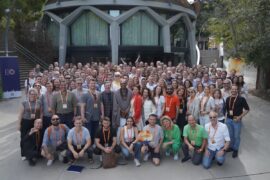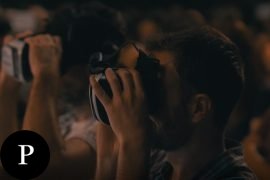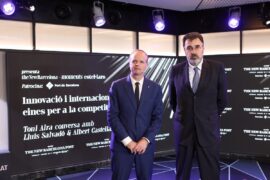
The publishing industry views Sant Jordi as a felicitous bubble...

Entrepreneurs' Organization promotes entrepreneurship in community and from a holistic...

The unremitting human emancipation from nature –transformed into “culture”– is...

The audiovisual sector has a motto that will always prevail:...

The Port of Barcelona is the city’s economic driving force...

The CEO of Acció, Albert Castellanos, and the president of...

Banco Sabadell, with the collaboration of the University of Barcelona,...

Would you like to walk around with the Giocconda under...

There are things that only happen once in a lifetime....

Then, Agbar becomes the first large corporation that restores its...

Música clásica sobre la arena de la playa en dos...

The first session of the cycle on the regatta organized...

The hospital's managing director, Manel del Castillo, and the pharmaceutical...

Generalitat y Ayuntamiento impulsarán dos equipamientos de 'Casa de les...

Leticia Beleta, director of Alexion Pharmaceuticals in Spain and Portugal,...

We all have a friend who never leaves the Gràcia...

Barcelona director opts for Best International Film with 'La sociedad...

The hotel and industrial sectors softened the market's decline last...

The technology company, with a workforce of 35 employees and...

“The women of yesteryear were strong and had to fight...
Post-truth has become a buzz term that explains everything (and nothing). The word is used as a derogative term for mass manipulation through malicious spread of data (de-contextualized or, simply put, false), by means of sophisticated and overwhelming technological means, in the guise of objectivity. This whole battery of ill-founded arguments aims to bombard the subject and influence his actions. However, this apparently novel coinage of “post-truth” is, in fact, older than truth itself.
Post-truth” is older than truth itself
Before Plato put forward his philosophical theory and raised the concept of truth to an ideal dimension, only reachable through intelligence, his master Socrates used to spend time holding discussions in the agora with the “sophists”, oratory masters like Gorgias or Protagoras, more interested in persuading their audiences than in conceiving pure universal concepts. It was precisely to one of these that Socrates addressed his opening lines of Plato’s Apology.
With a dramatic first-class manoeuvre by overexploitation of ellipsis (and referring to an event, known by everyone, analysed in retrospect, from its own reply) Socrates states: “I don’t know, men of Athens, how you were affected by my accusers. As for me, I was almost carried away by them, they spoke so persuasively. And yet almost nothing they said is true”. https://www.youtube.com/watch?v=5Y8CVDYzzcA
Even when the tools we have at our disposal nowadays manage to disseminate far beyond than in the past, the fabrication of discourse that unleashes feelings –with a tendency to tilting the scales in favour of one specific side– is not a 21st century invention. At the root of the European civilization can this trend be found, as a dialectical tension that confronts not only true and false but also rational truth and apparent truth. “Opinion”, highly valued nowadays, can be likened to volatile and unsubstantial thinking whereby –according to Parmenides, one of Plato’s referents– “cannot hold true faith”.
ENLIGHTENED FALSE CONSCIENCE
From the framework of knowledge from ancient Greece, there is an urgency to give one’s opinion about everything which, ultimately, leads to post-truth. Between antiquity to the post-modern era, Thomas Hobbes warned us that, together with words and their common meaning, we need to consider the bias and vested interest on who uses them, in order to complete its true meaning.
Hobbes, the author of Leviathan, seems to anticipate some of John Searle’s insights, formulated centuries later by establishing the different categories of speech acts. The use of language is understood as the intervention in the order of things of reality, transforms it and generates movement. A lie repeated thousands of times –like when we see it on the internet– takes on the appearance of truth, it becomes real, or that personal disqualification spreads, even when it starts off as a weak rumour, always ill-foundedly, was written by Rossini in “La calumnia è un venticello”.
In fact, this intriguing tradition is rooted in the inception of the history of Europe. Plato himself witnessed manipulation at a time, in retrospect, perceived as the golden age of arts, of political tradition and search of the truth. The contrast between those times and nowadays is non-existent, or at least, is not as striking as we could imagine; hence, the term “post-truth” carries a remarkable fallacy, if we think of it as a form qualitatively different from corruption.
A lie repeated thousands of times takes on the appearance of truth or that personal disqualification spreads, even when it starts off as a weak rumour, always ill-foundedly
The popularity of this term, nowadays, seems to be inseparable from a wish of an opposed sign, the desire for the principle of knowledge ideally conceived by philosophy. The paradox is a fact: truth is no longer an unconditional belief, but at the same time, there is a denial of the relativist predominance of its opposite, massively inducible. The critical diagnosis of “post-truth”, therefore, is nothing more than the last bastion of a movement dating back to many centuries, as explained by Peter Sloterdijk in his Critique of Cynical Reason. A self-complacent movement at ease with its own contradiction in the guise of “enlightened false conscience”.
MYTHICAL IGNORANCE
It should be recalled that the oracle had indicated to Socrates that he was the wisest of all the Greeks. The one who confessed to ignoring everything knew something that the specialists themselves ignored. He did know about his own ignorance, his inherent limitation to acquiring particular knowledge, chose to transcend the dogmas and opinions, through a continuous effort towards practical self-comprehension, in search of justice. Socrates aimed to be fulfilled through undisputed coherence, and alienated him even from death, which he voluntarily assumed.
Nevertheless, “believing”, living private and collective desires, is a human need, of universal validity across history, which goes hand in hand with the search for certainties. The cliché transition myth to logos –the jump from irrational belief to rationality devoid of all belief– is, in itself, mythical. Giorgio Colli explained that the birth of philosophy –love for lost knowledge– takes place in the context of sacred locations dedicated to prediction, which in turn evolves through Plato’s “expressive reformation”. The desire to be part of a permanent eternal truth, is only transformed formally. And the cynicism implicit in post-truth defines its current version.
“Believing”, living private and collective desires, is a human need, of universal validity
A world, which is more open-minded, more interconnected and more critical with grandiloquent discourses and ideologies than ever, facilitates, at the same time, a space to disseminate ill-founded opinions, offering an alternative to truth. A counter-argument is imposed with paradoxical authoritarism, as if the fact of being disseminated massively guaranteed its validity. This poses a new and twisted turn, supposedly democratic, to Michel Foucault’s Order of Discourse diagnosed in 1970, in his appearance at the Collège de France.
GLOBAL CAVES
Plato’s narrations, in the form of dialogue, speak metaphorically of an exit from the cave, in his The Republic’s well-known episode. An ascent to the light suggested by the philosopher, parallel to Socrates’ maieutics (the Greek word for midwifery, his mother being a midwife), the method he applied to “educate good men”.
In nowadays scenario, in this supposed interconnection, the cave seems to have disappeared. The direct vision of reality is taken for granted, and there is a desire of personal fulfillment through digital virtuality, sometimes immediately accessible.
The cave seems to have disappeared. The direct vision of reality is taken for granted, and there is a desire of personal fulfillment through digital virtuality
But the suppression of the idea of educating from ignorance, saving the painful and undefined transit between two dissimilar concepts –a deeply philosophical sign, i.e. searching for the truth, never quite realized– the 21st century individual seems to be endlessly exposed to the kingdom of post-truth, an open field for a new belief proudly unaware of itself.
Post-truth has become a buzz term that explains everything (and nothing). The word is used as a derogative term for mass manipulation through malicious spread of data (de-contextualized or, simply put, false), by means of sophisticated and overwhelming technological means, in the guise of objectivity. This whole battery of ill-founded arguments aims to bombard the subject and influence his actions. However, this apparently novel coinage of “post-truth” is, in fact, older than truth itself.
Post-truth” is older than truth itself
Before Plato put forward his philosophical theory and raised the concept of truth to an ideal dimension, only reachable through intelligence, his master Socrates used to spend time holding discussions in the agora with the “sophists”, oratory masters like Gorgias or Protagoras, more interested in persuading their audiences than in conceiving pure universal concepts. It was precisely to one of these that Socrates addressed his opening lines of Plato’s Apology.
With a dramatic first-class manoeuvre by overexploitation of ellipsis (and referring to an event, known by everyone, analysed in retrospect, from its own reply) Socrates states: “I don’t know, men of Athens, how you were affected by my accusers. As for me, I was almost carried away by them, they spoke so persuasively. And yet almost nothing they said is true”. https://www.youtube.com/watch?v=5Y8CVDYzzcA
Even when the tools we have at our disposal nowadays manage to disseminate far beyond than in the past, the fabrication of discourse that unleashes feelings –with a tendency to tilting the scales in favour of one specific side– is not a 21st century invention. At the root of the European civilization can this trend be found, as a dialectical tension that confronts not only true and false but also rational truth and apparent truth. “Opinion”, highly valued nowadays, can be likened to volatile and unsubstantial thinking whereby –according to Parmenides, one of Plato’s referents– “cannot hold true faith”.
ENLIGHTENED FALSE CONSCIENCE
From the framework of knowledge from ancient Greece, there is an urgency to give one’s opinion about everything which, ultimately, leads to post-truth. Between antiquity to the post-modern era, Thomas Hobbes warned us that, together with words and their common meaning, we need to consider the bias and vested interest on who uses them, in order to complete its true meaning.
Hobbes, the author of Leviathan, seems to anticipate some of John Searle’s insights, formulated centuries later by establishing the different categories of speech acts. The use of language is understood as the intervention in the order of things of reality, transforms it and generates movement. A lie repeated thousands of times –like when we see it on the internet– takes on the appearance of truth, it becomes real, or that personal disqualification spreads, even when it starts off as a weak rumour, always ill-foundedly, was written by Rossini in “La calumnia è un venticello”.
In fact, this intriguing tradition is rooted in the inception of the history of Europe. Plato himself witnessed manipulation at a time, in retrospect, perceived as the golden age of arts, of political tradition and search of the truth. The contrast between those times and nowadays is non-existent, or at least, is not as striking as we could imagine; hence, the term “post-truth” carries a remarkable fallacy, if we think of it as a form qualitatively different from corruption.
A lie repeated thousands of times takes on the appearance of truth or that personal disqualification spreads, even when it starts off as a weak rumour, always ill-foundedly
The popularity of this term, nowadays, seems to be inseparable from a wish of an opposed sign, the desire for the principle of knowledge ideally conceived by philosophy. The paradox is a fact: truth is no longer an unconditional belief, but at the same time, there is a denial of the relativist predominance of its opposite, massively inducible. The critical diagnosis of “post-truth”, therefore, is nothing more than the last bastion of a movement dating back to many centuries, as explained by Peter Sloterdijk in his Critique of Cynical Reason. A self-complacent movement at ease with its own contradiction in the guise of “enlightened false conscience”.
MYTHICAL IGNORANCE
It should be recalled that the oracle had indicated to Socrates that he was the wisest of all the Greeks. The one who confessed to ignoring everything knew something that the specialists themselves ignored. He did know about his own ignorance, his inherent limitation to acquiring particular knowledge, chose to transcend the dogmas and opinions, through a continuous effort towards practical self-comprehension, in search of justice. Socrates aimed to be fulfilled through undisputed coherence, and alienated him even from death, which he voluntarily assumed.
Nevertheless, “believing”, living private and collective desires, is a human need, of universal validity across history, which goes hand in hand with the search for certainties. The cliché transition myth to logos –the jump from irrational belief to rationality devoid of all belief– is, in itself, mythical. Giorgio Colli explained that the birth of philosophy –love for lost knowledge– takes place in the context of sacred locations dedicated to prediction, which in turn evolves through Plato’s “expressive reformation”. The desire to be part of a permanent eternal truth, is only transformed formally. And the cynicism implicit in post-truth defines its current version.
“Believing”, living private and collective desires, is a human need, of universal validity
A world, which is more open-minded, more interconnected and more critical with grandiloquent discourses and ideologies than ever, facilitates, at the same time, a space to disseminate ill-founded opinions, offering an alternative to truth. A counter-argument is imposed with paradoxical authoritarism, as if the fact of being disseminated massively guaranteed its validity. This poses a new and twisted turn, supposedly democratic, to Michel Foucault’s Order of Discourse diagnosed in 1970, in his appearance at the Collège de France.
GLOBAL CAVES
Plato’s narrations, in the form of dialogue, speak metaphorically of an exit from the cave, in his The Republic’s well-known episode. An ascent to the light suggested by the philosopher, parallel to Socrates’ maieutics (the Greek word for midwifery, his mother being a midwife), the method he applied to “educate good men”.
In nowadays scenario, in this supposed interconnection, the cave seems to have disappeared. The direct vision of reality is taken for granted, and there is a desire of personal fulfillment through digital virtuality, sometimes immediately accessible.
The cave seems to have disappeared. The direct vision of reality is taken for granted, and there is a desire of personal fulfillment through digital virtuality
But the suppression of the idea of educating from ignorance, saving the painful and undefined transit between two dissimilar concepts –a deeply philosophical sign, i.e. searching for the truth, never quite realized– the 21st century individual seems to be endlessly exposed to the kingdom of post-truth, an open field for a new belief proudly unaware of itself.
